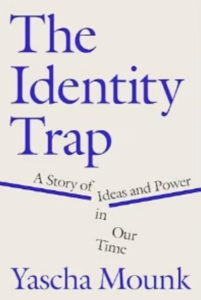For liberal democracy to function, we must be able to understand one another, New York Times columnist David Brooks writes in The Atlantic.
But is mutual understanding sabotaged by the personalized sectarianism of identity politics?
In his new book, The Identity Trap: A Story of Ideas and Power in Our Time, political scientist Yascha Mounk argues (above) that in recent decades, political discourse has been dominated by an unhealthy focus on group identities at the expense of universalist ideals.
What Mounk calls the identity trap can have some truly terrible consequences, analyst David Aaronovitch observes:
 The outlook that led to this “progressive separatism” [of the diverse vs the vulnerable] cannot, Mounk, argues, confer any advantage on minorities. “In a democracy,” he reminds readers, “fights over the distribution of scarce resources are, virtually by definition, usually won by more numerous and more powerful rather than less numerous and less powerful groups — making it, at best, an extremely risky tool for overcoming historical injustice.” Indeed, the claims made on the New Right for recognition of “white” identity are the mirror image of “progressive separatism” of this sort.
The outlook that led to this “progressive separatism” [of the diverse vs the vulnerable] cannot, Mounk, argues, confer any advantage on minorities. “In a democracy,” he reminds readers, “fights over the distribution of scarce resources are, virtually by definition, usually won by more numerous and more powerful rather than less numerous and less powerful groups — making it, at best, an extremely risky tool for overcoming historical injustice.” Indeed, the claims made on the New Right for recognition of “white” identity are the mirror image of “progressive separatism” of this sort.
Mounk – a contributor to the National Endowment for Democracy’s Journal of Democracy – cites the late black gay civil rights activist Bayard Rustin’s observation that simply belaboring the heads of the majority for their (or their forebears’) sins “can never produce anything politically creative. It will not improve the lot of the unemployed and the ill-housed. On the other hand it could well happen that the guilty party, in order to lighten his uncomfortable moral burden, will finally begin to rationalize his sins and affirm them as virtues. And by such a process, today’s ally can become tomorrow’s enemy.”
The post-liberal right and post-liberal left are much closer to each other than many people realise. Both are intolerant; both prioritise the power of the state over individual liberty, The Economist adds. They “see each other as mortal enemies”, but “feed on each other”, Mr Mounk warns. That is why “everyone who cares about the survival of free societies should vow to fight both.”
For liberal democracy to function, we must be able to understand one another, @nytdavidbrooks writes in @TheAtlantic. https://t.co/oOzuCoWVrk
— Democracy Digest (@demdigest) October 24, 2023







